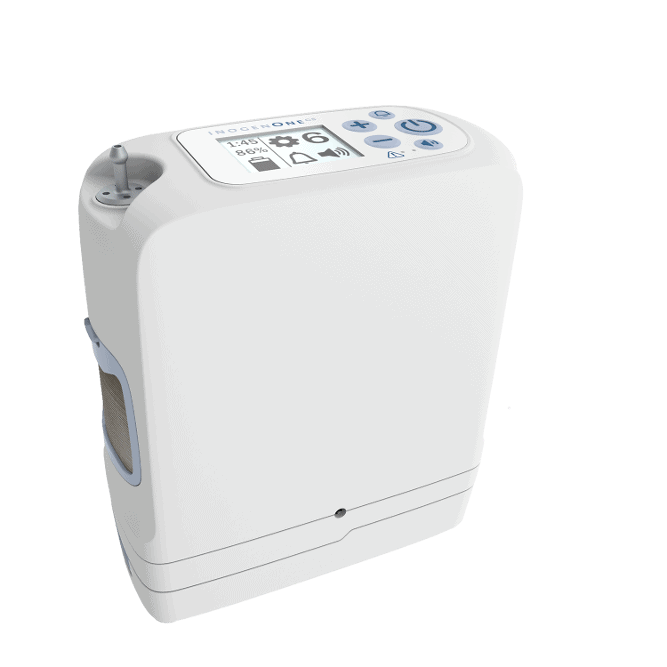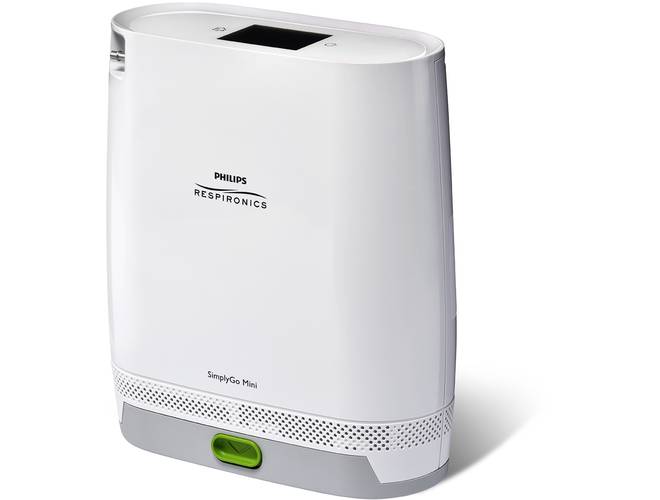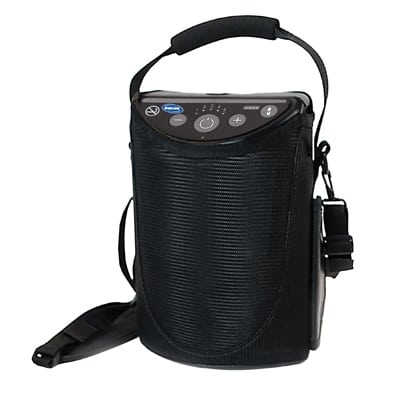Guide to Portable Oxygen Concentrators

What is a Portable Oxygen Concentrator?
Portable oxygen concentrators refine the air around us to maximize the oxygen we breathe and absorb into our bloodstream. Air contains 78 percent nitrogen, 21 percent oxygen, and 1 percent other gasses. An oxygen concentrator draws in air and runs it through a compressor, which compresses it and passes it to a sieve bed that becomes saturated with nitrogen. A portable oxygen concentrator removes the nitrogen from the air, leaving the oxygen at about 95 percent purity. That oxygen is delivered to you via a mask or nasal cannula.
Pro Tip: Not all portable oxygen concentrators are covered by Medicare.
Two types of portable oxygen concentrators can be used for different purposes based on how much oxygen you need.
- Pulse flow: The concentrator in a pulse-flow unit is activated to coincide with your typical breathing patterns instead of providing a steady stream of oxygen. Because the flow isn’t continuous, these concentrators are better if you can breathe on your own but need a little extra assistance. Pulse-flow units are favored by active users, and, since they aren’t constantly operating, they tend to offer better battery life.
- Continuous flow: Continuous-flow units provide a consistent, steady stream of oxygen. If you have severe COPD or sleep apnea, these units may be right for you. A pulse-flow machine may be recommended if you have an oxygen requirement of 2 liters per minute, but a continuous-flow machine is better suited to handle users who need around 5 LPM.
Note: Choosing the best portable oxygen concentrator should never be done alone. Only your physician knows the best course of treatment for your oxygen levels, so always consult with them before making any medical decisions.
Where to Purchase a Portable Oxygen Concentrator
Purchasing a portable oxygen concentrator can be a different process for different people, and the best course of action is to consult with your physician. Your specific oxygen requirement will be unique to you, and some portable oxygen concentrators are better suited to particular oxygen levels. In most cases, medical-grade portable oxygen concentrators can’t be purchased without a prescription from a doctor defining your oxygen levels.

Once you receive the necessary guidance from your physician, the best place to purchase a portable oxygen concentrator is often directly from the manufacturer. There are many after-market sellers that offer portable oxygen concentrators — occasionally at better prices than the manufacturers themselves — but the manufacturers typically provide more reliable customer service that can work with your doctors and insurance to offer the lowest possible prices. Since portable oxygen concentrators are considered durable medical equipment, some of them are even covered by Medicare.
Portable oxygen concentrators tend to be expensive, often costing upward of $4,000. There are now some affordable oxygen concentrators on the market you may be able to afford even without insurance.
Pro Tip: Buying a portable oxygen concentrator can be costly, and it may not be covered by your insurance. Some manufacturers, however, offer portable oxygen concentrators on a rental basis, which may make the units eligible for insurance coverage and save you money.
The Best Portable Oxygen Concentrators
For better or worse, there isn’t a huge selection of portable oxygen concentrators on the market. It’s a bit of a shame that there isn’t a wider selection to choose from, but thankfully the options available are well-designed, highly effective pieces of portable medical tech. Let’s take a quick look at some of the best portable oxygen concentrator options available and for whom they might work the best.
Best in Class: Inogen One G5

For nearly two decades, Inogen has been an innovator in portable and home-based oxygen concentrators. Its flagship model, the Inogen One G3, was the gold standard for pulse-flow portable oxygen concentrators until it launched the G5 model, which took what made the G3 great and improved upon it in nearly every way. The Inogen One G5 isn’t cheap; you can expect to pay upward of $2,500. But with the price tag comes a host of best-in-class features. Let’s take a look at some of the device’s high-level features. For a more in-depth breakdown, check out our Inogen One G5 review.
- Six flow settings that allow you to control the amount of oxygen you receive.
- Thirteen hours of battery life when paired with a double battery, or six hours with a standard battery.
- Weighs less than 5 pounds.
- Pairs with the Inogen Connect app to track device performance.
- FAA-approved, so it can be taken on flights.
Best for Continuous Flow: Philips Respironics SimplyGo
Created by one of the most recognizable names in tech, the SimplyGo from Philips is among the smallest portable oxygen concentrators with a continuous-flow setting. Users can also set the device to deliver pulse oxygen, but the ability to provide continuous flow — even for a short time — can be a game-changer if you require varying amounts of oxygen during the day. Let’s take a quick look at some of our favorite SimplyGo features.
- Weighs 10 pounds, which is on the high end for a portable oxygen concentrator. It’s still one of the lightest units that offers continuous oxygen flow, however.
- Oxygen concentration levels of 86 to 97 percent, some of the highest in the industry.
- More than a dozen oxygen settings in both pulse and continuous modes to regulate the amount of oxygen you need.
- Altitude rated to 10,000 feet.
Best Lightweight Model: AirSep Focus
One of the essential qualities we look for in a portable oxygen concentrator is that it can be carried around all day, but some devices go above and beyond. The AirSep Focus weighs in at around 2 pounds — nearly half the weight of comparable portable oxygen concentrators. The device isn’t perfect for all-day use since it’s limited by its battery life, but this pulse-flow model is one of the best for running quick errands or short walks. Here are some of the finer points of the AirSep Focus.
- Ultra-lightweight — the entire unit weighs less than 2 pounds.
- An hour and a half of battery life per battery, but batteries can be swapped out to extend the device’s life.
- Two pulse oxygen settings at 90 percent concentration.
Portable Oxygen Concentrator Accessories

There are many accessories you can add to your portable oxygen concentrator to make the most of your unit. Let’s take a look at some of the options.
- Extended batteries: Most portable oxygen concentrators offer additional external batteries or batteries with larger capacities that can be swapped out to extend the devices’ lives.
- Carrying cases: Most portable oxygen concentrators feature special cases that can be used to carry the units around. Some cases are backpack-style, while others offer shoulder-strap carriers.
- Replacement parts: Portable oxygen concentrators filter air, so their filters need to be replaced occasionally to ensure functionality. Particle filters and column pairs that help power the concentrator typically can be bought separately from the devices.
- Masks and cannulas: Portable oxygen concentrators require a way to deliver oxygen to the user. Typically it’s via a nasal cannula tube, but sometimes it’s a mask.
Recap of Portable Oxygen Concentrators
No matter why you need extra oxygen, it’s great knowing that modern technology has made advancements in portable oxygen concentrators that enable you to live a full, active life while receiving the care you need to breathe free. Hopefully future iterations of portable oxygen concentrators will lead to even lighter-weight models with longer battery lives.
Portable oxygen concentrators are an excellent way for people with respiratory illnesses to stay active, which can aid in the healing process. With more than 1.5 million Americans requiring additional oxygen, it’s a problem that won’t be going away soon.
Portable Oxygen Concentrator Frequently Asked Questions
-
Do you need a prescription to buy a portable oxygen concentrator?
Generally, yes, you need a prescription to buy a portable oxygen concentrator. Some devices can be purchased without a prescription, but they may not offer the same medically recommended level of oxygen as those that require prescriptions. Always consult a physician before purchasing a portable oxygen concentrator.
-
What is the smallest portable oxygen concentrator?
At less than 2 pounds, the AirSep Focus is the lightest portable oxygen concentrator on the market.
-
Will Medicare pay for portable oxygen concentrators?
Medicare may cover the cost of some portable oxygen concentrators, especially if they’re rental units. Circumstances and plans differ for everyone, however, so it’s best to consult your plan. Inogen, in particular, participates in certain Medicare plan coverages.
-
Does being on oxygen weaken your lungs?
Some studies have shown that breathing only high concentrations of oxygen for long periods of time can have negative effects on the lungs. Most doctors recommend oxygen therapy as a short-term or intermittent solution to avoid potential lung damage.
-
Which is better: an oxygen tank or oxygen concentrator?
Oxygen concentrators are generally better than tanks because their function is nearly unlimited. Whereas oxygen tanks have a finite amount of oxygen, concentrators pull oxygen directly from the air, which means they never run out of oxygen.
